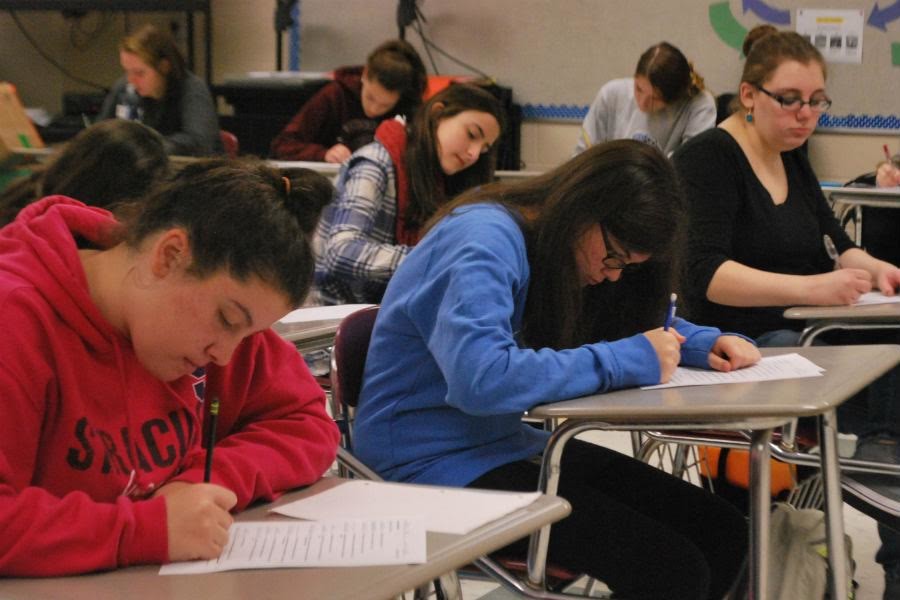MCAS 2.0 slated for 2017 implementation
November 30, 2015
Last school year, students in grades three through eight took the Partnership for Assessment of Readiness for College and Careers (PARCC) test in place of the Massachusetts Comprehensive Assessment System (MCAS). This was supposed to prepare students for the likely permanent implementation of PARCC in the future. However, on November 17th, 2015, the Massachusetts Board of Elementary and Secondary Education voted to replace the math and English PARCC with a new test that incorporates parts of both previous tests; science MCAS will remain as is.
The hybrid’s implementation is planned for 2017, and according to Math Curriculum Coordinator Cathy Coughlin, the catalyst behind the change was that the MA board did not want other states telling them what they could do regarding testing. The MCAS is a Massachusetts test, while the PARCC is not specifically geared toward any individual state.
“When the PARCC came in, it was a consortium of different states,” she said.
Additionally, the PARCC itself is not tuned to MA state standards, leading to some unwillingness to give the test.
“It sounds as though a lot of the concern comes from the idea of […] taking a test that [isn’t] strictly tuned to Massachusetts state standards although our standards are modeled after Common Core,” said Keirstead.
Because of MA’s current high rank in the nation based on various scores, educators and members of the board do not wish to give a test that could cause our testing system to regress.
“Massachusetts has been number one […] in the country in terms […] of a number of different scores. […] If we’re setting the bar — and we’ve been setting the bar — why would we do something that doesn’t fit with what we’re doing? We don’t want to regress,” said English Curriculum Coordinator Janet Keirstead. “That’s a concern people have: if Massachusetts is already number one, why are we changing to a national test? Why isn’t the national test changing to what Massachusetts does?”
As MA moves away from 100 percent PARCC or MCAS, teachers and faculty have mostly positive feelings towards the hybrid.
“I know PARCC is more throughout the country and so forth based on Common Core. I think it’s going to be a nice compromise adjusting the MCAS exam [and] weaving in some college and career readiness questions, so I think that the commission is trying to find a balance between the PARCC and the MCAS and I think it’s the best move,” said Principal James Antonelli.
MA’s decision to move away from the PARCC and towards a different test is not extraordinary considering other states are doing the same. According to the Washington Post, in 2010, more than two dozen states associated themselves with the PARCC test. That number has steadily decreased since then, and only seven states and the District of Columbia plan to give the test during the 2015-2016 school year.
MA originally decided to make the transition to PARCC after being one of the twelve states to win the Race to the Top competition funded by the U.S. Department of Education. When MA accepted the funding, it also agreed to implement the Common Core and Common Core relating testing. However, the implications regarding this funding now that MA has decided to move away from the PARCC are not quite clear.
“We took a small amount of money from Race to the Top; it’s under 40 thousand dollars. That’s federal funding, so we’re dealing with state issues in regards to the MCAS. […] once you commit to that money, you’re bound to all the [rules] that come with it,” said Antonelli.
According to Coughlin, until 2017, the middle and elementary schools will continue with the PARCC because they did it last year, while the high school will remain with MCAS. Though the board has set 2017 as the goal for implementation of the MCAS-PARCC hybrid, many view the goal as too lofty.
“Usually there’s some kind of test of the test […] I think [2017] is a tight timeline. I don’t know how well that’s going to manifest itself,” said Coughlin.
It is unclear if the switch to the hybrid test will occur for high school, middle, and elementary school students simultaneously; the MCAS graduation requirement for WA seniors is currently projected to last until 2019. PARCC lasts until eleventh grade, unlike MCAS which ends in tenth grade, and the implications of that for the hybrid test are ambiguous.
“In Westford, we would want to see the test before they actually make it part of graduation requirements. It doesn’t mean we wouldn’t give the test, we just might not tie it to graduation,” said Coughlin.
The board has not yet introduced the redesigned test’s composition to teachers, and many educators have mixed feelings towards the hybrid, including Keirstead.
“I have a mixed opinion […] it depends on what it actually looks like […] I prefer the idea of a hybrid to 100% PARCC, but I will be interested to see how much of a true hybrid it is, or if it’s mostly PARCC based, or mostly MCAS based […] I need to know a little bit more about the test,” said Keirstead.
Besides the content of the test being changed, the state is committing to making the hybrid test computer-based with the goal of implementing this in the spring of 2019. During PARCC testing in spring of 2015, the Crisafulli school took the online version of the test.
Students and teachers alike can understand the benefit of moving to online testing, especially for the English Language Arts long composition test as in this current day and age, most essays are written on the computer.
“In a way it’s sensible, because how often do you handwrite writing pieces? […] From a writing perspective, it makes more sense to go online now,” said Keirstead.
On the other hand, this could be concerning for the math test, as students typically do math on paper and rarely have practiced taking online math exams.
“I have no doubt that our students could [graph two lines on paper] […] but without the practice, if we don’t have this technology [to do this online], that’s where I think we’re going to end up with an issue. […] I’m not sure when that technology would be available for the teachers to practice with the students, and I wouldn’t want them to see that for the first time on a test,” said Coughlin. “Because of the fact it’s math, it’s much harder to do on the computer than it would be if it were handwritten.
Though the board has already voted on this new test, and the plan will move forward, there are some concerns regarding cost. Before, Massachusetts joined a few other states in paying PARCC to create the new standardized test that was used last year for testing in grades three through eight. That test was supposed to remain in use, but now with the decision to move to the hybrid, Massachusetts must pay another test maker to create the exam.
“They’ve got to pay someone else to make the new test now,” said Coughlin. “They already paid someone to make the PARCC test. Where this money comes from, I don’t know. It’s going to come from the state because they’re the ones who decided to do this, but now they’ve already paid for part of a test and they have to pay for [another one].”
Despite the concerns, many consider the test to be a positive change, and teachers are curious to see how it will work out in the long run.
“I’m interested to see where it goes and how it all rolls out. I feel lucky to work in a district where we do have such dedicated learners, hardworking and committed faculty, and strong parental support,” said Keirstead.







